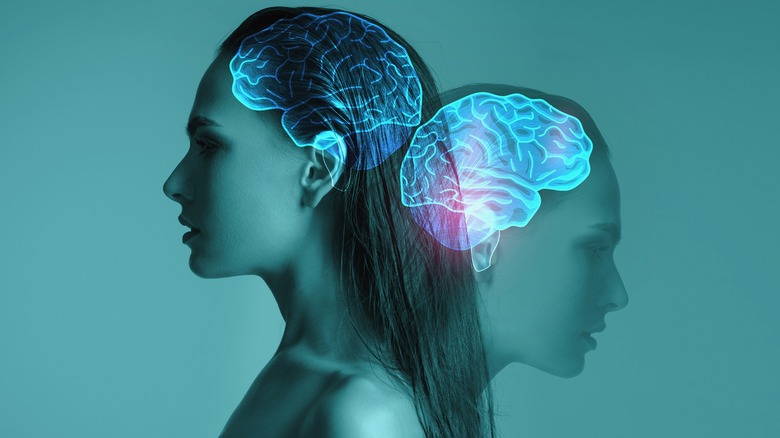What To Know About The Latest Research On How COVID Affects The Brain
Long-COVID is referred to the various health conditions that can occur after recovering from a COVID-19 infection, according to the Centers for Disease Control and Prevention (CDC). General symptoms can include fatigue that disrupts daily life, respiratory symptoms, cognitive issues, digestive problems, and joint or muscle pain. People with long-COVID could also be more susceptible to neurological and heart conditions.
In fact, new research, which will be presented next week at the Radiological Society of North America (RSNA) annual meeting, found that a COVID-19 infection can produce significant brain changes up to six months after recovery (via RSNA press release). Researchers conducted MRI scans of 46 individuals who had recuperated from COVID-19 within six months and compared them with the MRI results of 30 people who didn't have COVID-19.
Those who had the disease had changes in the brain associated with fatigue, insomnia, anxiety, depression, headache, and other cognitive problems. Some differences in the brain were associated with releasing hormones and regulating sleep.
Research explains neurological issues associated with COVID-19
The study's co-author, Sapna S. Mishra, says that previous studies on COVID-19 didn't focus on detecting brain changes. "Our study highlights this new aspect of the neurological effects of COVID-19 and reports significant abnormalities in COVID survivors," Mishra explained via the RSNA press release.
Mishra also said that the study only showed how the brain changed six months after, so it's not clear whether these changes are permanent. Therefore, she and her research team are continuing to monitor these same patients to track any long-term brain changes.
Keep in mind that most people who develop long-COVID had a severe COVID-19 infection, didn't get vaccinated, or had other health conditions beforehand (via CDC). However, some with mild COVID-19 cases, or those who were asymptomatic, can also develop long-COVID. Long-COVID is difficult to diagnose because there is no single test and its symptoms are similar to other health conditions.
In fact, as many as 30% of people who have had COVID-19 can develop long-COVID, according to The American Medical Association. Long-COVID can be divided into three types. The first type entails lingering symptoms associated with cell damage that prevents full recovery. The second is muscle weakness and cognitive issues seen in people who required hospitalization from the disease. And the third type can be seen in individuals with a variety of symptoms that can appear due to the person's immune system.


